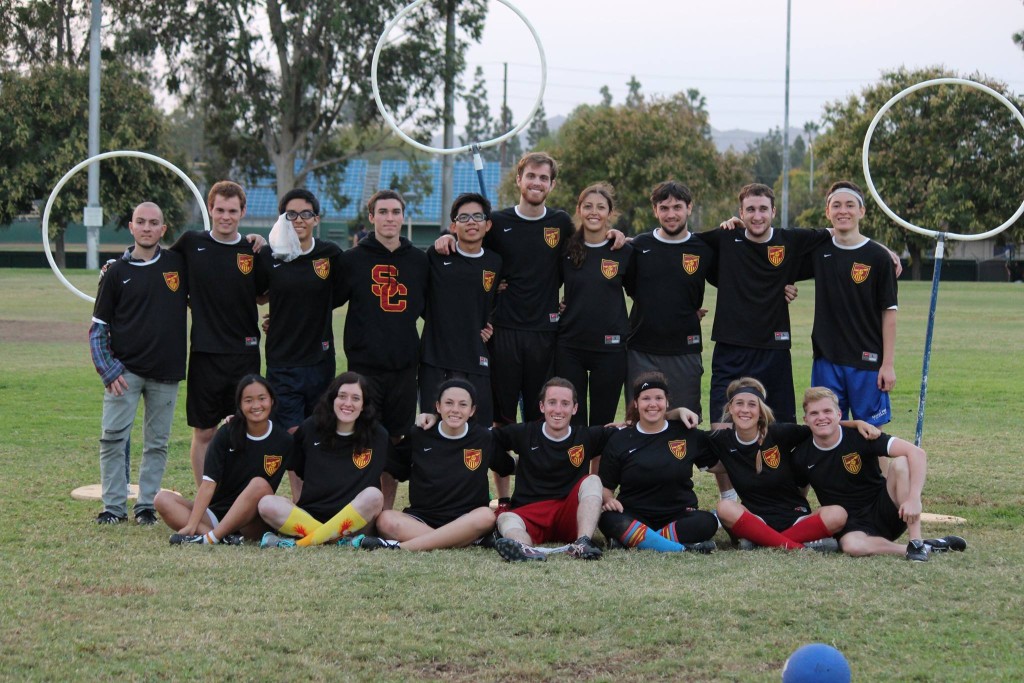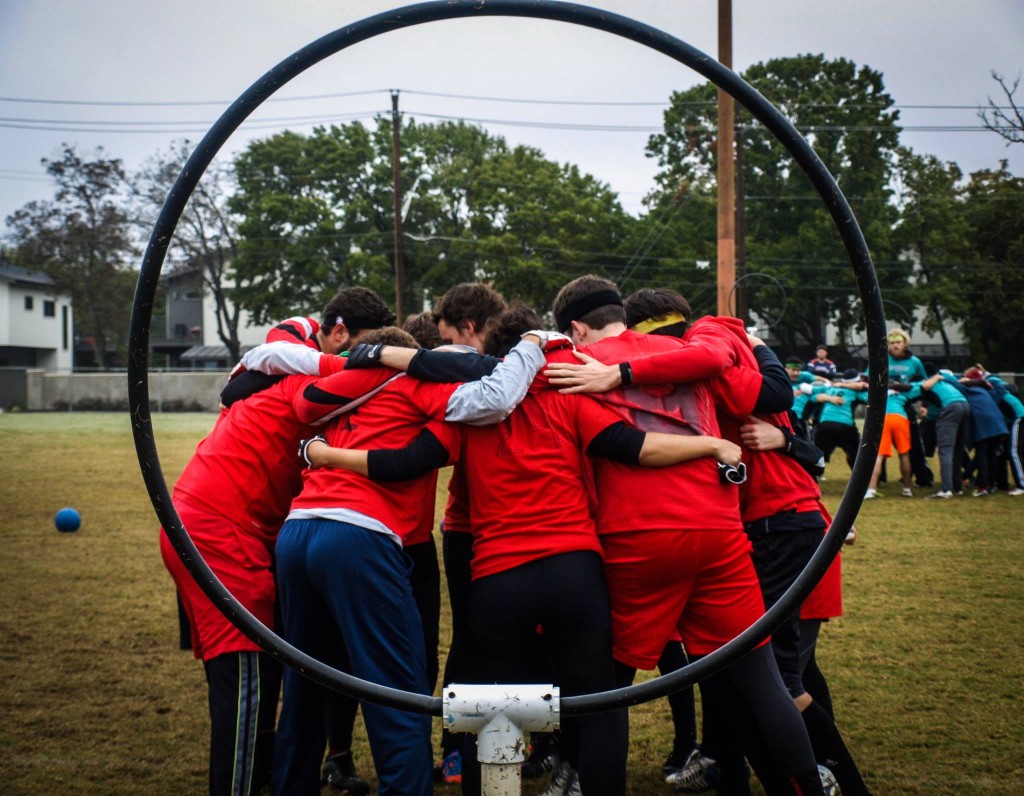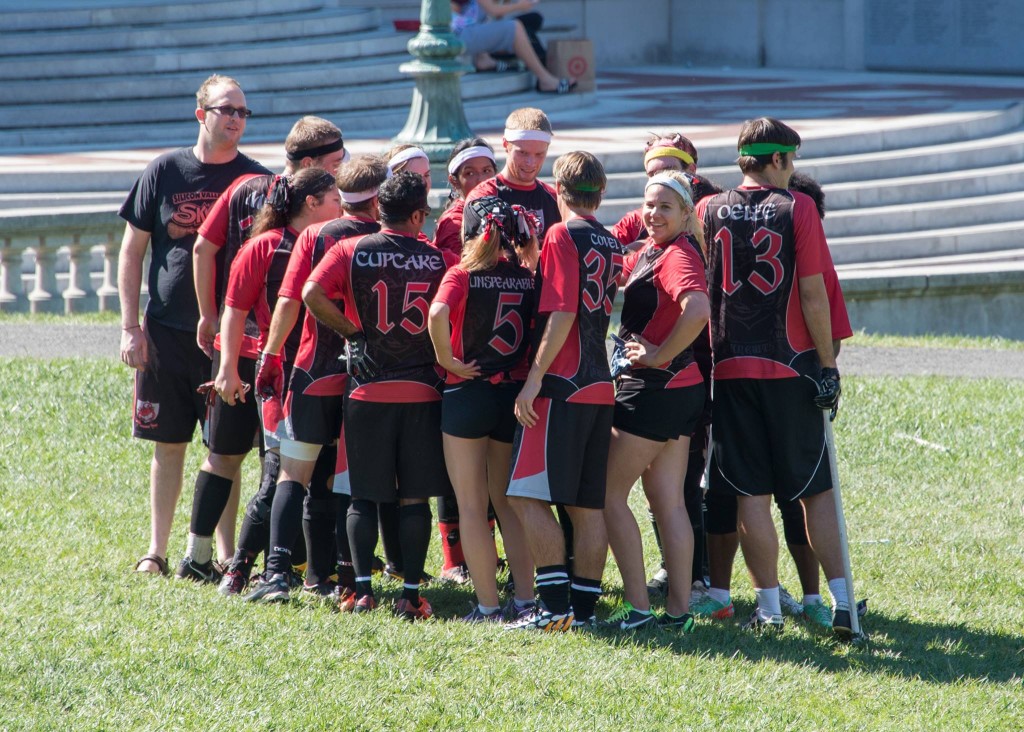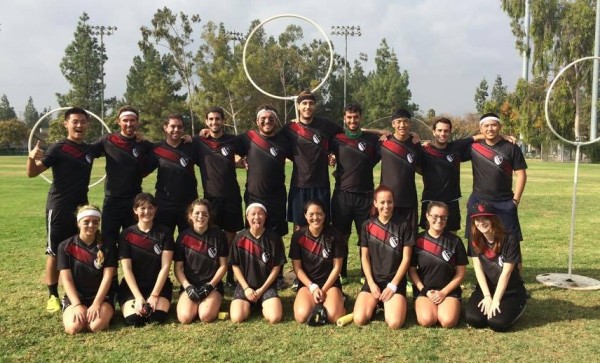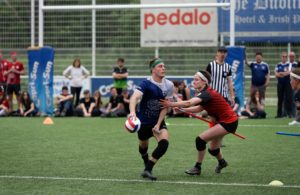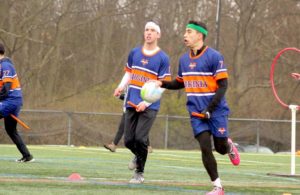- Rule, Britannia, no more?
- Unpopular Opinions: US Quadball Cup 2023
- Proven Contenders: University of Virginia
- Proven Contenders: Rutgers University
- Proven Contenders: University of Michigan
- Proven Contenders: Creighton University
- Different Perspectives: A Look Inside USA Ultimate
- Antwerp QC, Much of Belgian Core, Leaves Competitive Quidditch
Wild-Card West: A Fall Wrap-Up
- By Kevin Oelze
- Updated: January 6, 2015
Five out of the seven regional championships of the 2014-15 season had or have clear favorites to win them. University of Maryland was ordained the best team in the region even before they took the regional crown. Lone Star Quidditch Club leads the Southwest. Florida’s Finest is dominating the South. Ohio State University was a strong favorite before they took the Midwestern crown. Even the Northeast was a three horse race between Tufts Quidditch, New York University and QC Boston: the Massacre before Tufts took home the title. Look at the West, however, and, though we’re entering the second half of the season, it’s still difficult to determine a favorite. At least five teams can make credible Top-20 and regional-contender arguments, with several dark horses looking in. Let’s take a look at where these teams stand as we round into the second half of the season
THE FIESTY FIGHTERS
- University of Southern California
University of Southern California has long been a huge name in the West. After qualifying last season, they failed to attend World Cup VII, keeping alive their ludicrous streak of being undefeated outside of the West. Unfortunately, USC’s problem has never been talent. It’s always been commitment. But their early returns look promising. They attended a tournament six hours away in Flagstaff, Ariz. (which was retroactively made unofficial) and showed up with a relatively strong roster to the Riverside Rumble. Many of the familiar names are there. The beating core is anchored by captain Nicky Guangorena, and stud utility man David Demarest is still with the team. They didn’t have the most impressive of results at Riverside Rumble, with a disappointing loss to Riverside Quidditch and a blowout loss to the Lost Boys QC. We’ll see how this team progresses with more seasoning against elite competition, but it’s hard to make a verdict on them until we see more.
- San Jose State University
Long considered the worst school team in the Bay Area, San Jose State University has stepped out of the shadow and firmly taken their place as the second best team in the Bay. SJSU doesn’t have a realistic chance of taking the regional championship, but they may be the team most likely to stage an unlikely upset. They have several impressive results, but none are wins: they are 0-5 against regional rivals Silicon Valley Skrewts, but three of those games were in snitch range, with SJSU having a decent chance to win. Arguably, the most impressive win on their resume is a 70-point loss to the LA Gambits, in which their extremely physical chaser core was able to match up reasonably well with the best chaser core in the region, limiting their deficit to 40 points at the snitch pull. Their quaffle game has been anchored offensively by Cody Gradone and Jacob Schekman with Dan Marovich adding a strong, physical presence at the keeper position. Most notably, they’ve done this without a roster appearance by Albert Ramos, their best quaffle player from last season who has been dealing with a knee injury. The team’s beater game has been anchored by captain Kyle Campbell, and, while they will never dominate a game with their beaters, they don’t need to with their chaser line. Their beater line is strong enough that it’s very difficult to dominate the beater game against them. If this team has a glaring weakness, it’s been their inability to find a strong seeker, as they’ve be unable to finish upsets with the necessary snitch pull. Still, if they were to find a fortuitous snitch pull, this team could spring an upset on somebody.
“SO YOU’RE SAYING THERE’S A CHANCE…”
- Northern Arizona University
Northern Arizona University rose into this category and not the previous category on the sole strength of their unofficial tournament win at Lumberjack Invitational, where they defeated Arizona Quidditch Club in the finals. Unfortunately, the rest of the NAU season has not been particularly impressive. They’ve been unable to put in a really strong result, and, like most of Arizona, they haven’t logged a tournament minute since Lumberjack. That being said, NAU has maintained their identity: they have a strong beater game, an extremely physical chaser game and a stud seeker in Porter Marsh (who, admittedly, had a very mortal season last year). This isn’t a team that’s powered by a couple of stars, but it is a relatively deep team that has a strong identity and plays to it. They can be dangerous to play against for any team that can’t match their physicality.
- Crimson Elite
Another relatively unknown team, Crimson Elite has taken on a new identity this year, posting somewhat strong showings at the Crimson Cup and Lumberjack Invitational. Unfortunately, their geographic isolation makes it hard to say much about them in comparison to most of the West. They notched a very impressive win over NAU at Crimson Cup, but that NAU squad has greatly improved since then. After that, the Crimson Elite played at Lone Star Cup, where they were less successful than the Gambits. Still, this team has a reasonably strong beater core, a strong chaser core and a commitment to wanting to be the best. It’s hard to put them higher than this with limited positive results. However, one could also imagine this team being an upset threat against the teams ranked above them once they get their full roster at a tournament, especially with as much experience as they’ve developed this year.
- Santa Barbara Blacktips
The Santa Barbara Blacktips issued the most stunning upset so far in the West this season, as they dispatched a depleted Lost Boys roster that would go on to win The Next Best West 2. Santa Barbara managed this win by playing extremely aggressively, attacking Peter Lee at every opportunity and putting so much pressure on him that it was difficult for him to impact the game as much as he usually does. They also nearly toppled the depleted Skrewts at that same tournament, losing out after a major comeback from the Skrewts that gave the Silicon Valley team a ten-point victory. They have a very strong beater core—easily the strongest group outside of the top five—and they back that up with plenty of athleticism from their chasers. Unlike last year’s team—which was all about a strong top three—this one is deeper and not as top-heavy. Remaining star Ben Harding has stepped up his game, as he’s become one of the primary playmakers for the team after losing Ren Bettendorf to the Gambits and Chris Lock to the Skrewts. Their strongest new player is chaser and keeper Jeremy McIntyre, who had a great showing at Next Best West 2. They used a combination of strong drives and quick, hard passes behind the goals to manufacture most of their offense.
ON THE OUTSIDE, LOOKING IN
- University of California in Los Angeles
Who is this team? Seriously, does anyone know? UCLA remains a contender for the regional crown, but they’ve yet to play a single game this season. Thankfully, we’ll see them soon, as they are scheduled to open their season at The LA Open on January 17. This team will feel the loss (especially of leadership) of Team USA chaser Brandon Scapa, but Team USA keeper Zach Luce and star chaser Adam Richardson gives them a great 1-2 punch. Their beater core should be augmented by Phil Raucci, who was the anchor on Wizards of Westwood the previous season. It’s likely to be a similar beater core to last year: unlikely to dominate many games but also unlikely to be dominated. This team has always recruited well, and its ability to field two official teams again bodes well for that. A solid recruiting class could put them as the best team in the West, but it’s hard to know until they actually see the field.
- Silicon Valley Skrewts
This team is so tantalizing on paper, but they’ve been unable to bring a full squad to a single tournament this year. They went undefeated through the Bay Area, although they did play three snitch-range games against SJSU. Fortunately for them, their seeker rotation of Forrest Stone, Craig Kaplan and Chinua Shaw has been up to the task, leaving the Skrewts undefeated with a 4-0 record in SWIM situations. Their only two losses have been in a depleted state, lacking, arguably, their three best quaffle players in Alex Makk, Sam Harris and Kevin Oelze. Those losses were to a similarly depleted Lost Boys squad twice in blowout fashion, which suggests that the problem for this team was strategical against dynamo beater Lee rather than simply being down players. Still, at full strength, this team should be able to play with anyone in the West. The pairing of Willis Miles IV and Team USA beater Kyrie Timbrook remains one of the best in quidditch, but the depth behind them has been questionable so far this year, with the Skrewts having to convert multiple chasers to beaters to provide depth. The chaser squad, however, runs deep. But, without Makk, this squad is probably one of the weaker chaser groups among the strong teams in the West, often forcing more responsibility onto the beaters than may normally be wise. With Makk, this team could be the best in the West, but it’s hard to trust a team that will not have its full squad together once until the West Regional Championship. They’re projected to be at full strength by February, with captain Oelze returning from back surgery. However, he’s likely to show the rust that accumulates from not having played since World Cup VII. How well this chaser core is able to find their chemistry will make the difference between a regional championship and a quarterfinal exit.
THE FAVORITES?
- Arizona Quidditch Club
AZQC has taken on the identity of the old NAU teams of their captain Cooper Davis. This is a team that hits hard, doesn’t care if they draw cards and trusts their seeker. Luckily for them, they have one of the best seekers in the country in Margo Aleman. This is a difficult team to score on, with Aleman joining former Arizona State University chaser Ethan Kapke; NAU chasers Nate Cortazzo and Duncan Lewis; and former University of Arizona chasers Savio Vu and Shaye Lander. Anchoring their beater line is Amanda Nagy, who remains one of the stronger female beaters in the game, although she is not surrounded by as much talent as she was on the Lost Boys last year. If this team has a hole, it’s at male beater, forcing a conversion to the position for Davis. However, they have managed to go blow for blow with the Gambits, ousting them from the Lumberjack Invitational. If they can get a little more depth from fall graduates, this is a team that could go all the way in Placer Valley.
- Los Angeles Gambits
If I were forced to choose a regional champion with a gun to my head at this exact second, I’d pick the Gambits. Unfortunately, the scoreboard doesn’t lie, and that forces me to put them at second in these rankings. The chaser core is second to none in the region. The pairing of Bettendorf and Tony Rodriguez is one of the scariest duos in the league, and that’s before you consider other weapons such as Andrew Murray, Alex Richardson and Julie Brietigam. The beater core isn’t the best in the league, but it’s a smart group. Rather than trying to win games through beater dominance, they have taken the frequently-seen strategy by some of the better Southwest teams of simply trying to neutralize the other team’s beaters by constant use of physicality. The grouping of Tyler Bryce, Steve DiCarlo and Duston Mazella pairs well with former Lost Boys and Riverside Quidditch beater Alyssa Burton, and the entire group is exceedingly comfortable with going on the offensive and making a hit. They employ the 1.5-bludger offense whenever they have a chance. The seekers are solid between Richardson and DiCarlo, but this is a team that will thrive on putting others out of snitch range. The Gambits, at their best, can look impeccable, with their most impressive result being their snitch range loss to University of Texas. If they have a weakness, it would be that Bettendorf and Rodriguez haven’t developed elite-level chemistry yet. However, given time, that chemistry will come. When that happens, the rest of the country had better look out.
- Lost Boys QC
Still the kings of the West, the Lost Boys gain this top seed with their undermanned victory at Next Best West 2. At that tournament, the Lost Boys displayed a very familiar style: using their incredible grouping of male beaters to put unbelievable pressure on the opposing teams. Losing Rodriguez, DiCarlo, Nagy and Burton would hurt any team, but this team has bounced back spectacularly, with Team USA’s Alex Browne showcasing his immense range of talents (and impressive vertical) when a team is built around him. There is very little new, positive things to say about this team: they still have a great chaser game backed up by an elite beater game, and they’ve added Scapa and former Skrewt Frank Gao to their chaser line. However, their seeking game could be a gaping weakness. In the finals of Next Best West 2, beater Austin Izquierdo pulled the winning snitch, but it was almost gift-wrapped to him because of how much pressure Gambits’ seeker Richardson was putting on the snitch. This is a team that may have some problems reliably pulling a snitch, and, in a snitch-range game, that could force them to put a lot of beater pressure on the man in yellow. Indeed, the Gambits almost rode that formula to beat the Lost Boys at Next Best West 2, as they had managed to pull ahead of and almost out of snitch range of the Lost Boys using their superior chaser core while the snitch was on the pitch. If a team is ready to exploit that weakness, we may see the Lost Boys fall out of snitch range to one of the other top Western teams. However, until that happens, these guys take the top spot and look to emerge from a crowded field in Placer Valley.
Related Posts
About Kevin Oelze
Kevin is the co-founder and technical director of The Eighth Man. In his off time, he masquerades as a software engineer, and actively participates in karaoke duels. Despite the rules calling for Jason Mraz-only duels, his go-to song is ""Brighter than Sunshine"" by Aqualung.

